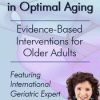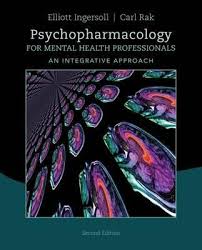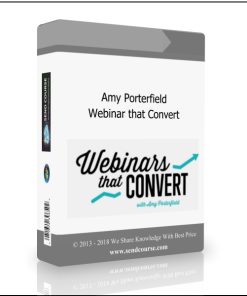Psychopharmacology for Mental Health Professionals – Alan S. Bloom | Available Now !
$200.00 Original price was: $200.00.$56.00Current price is: $56.00.
Psychopharmacology for Mental Health Professionals – Alan S. Bloom | Instant Download !
PLEASE CHECK VIDEO OF ALL CONTENTS HERE:
Most clients with DSM-5® diagnoses are being treated with a combination of psychological and pharmacological treatments. Newer drugs are being developed to treat mental disorders based on a better understanding of neurobiological contributions to mental disorders and the latest pharmacological research. To provide appropriate services, you are expected to have a thorough understanding of these common and complex issues. As a mental health professional, keeping up-to-date is essential.
This recording will update and increase your knowledge of:
- Neurobiological underpinnings of major DSM-5® diagnoses
- Effects and side effects of drugs used to treat these diagnoses
- Responsibilities of the non-prescribing therapist to clients taking psychiatric medication
Specifics of the pharmacological treatment and drugs of choice for Depressive, Bipolar, Schizophrenia Spectrum, Anxiety, OCD, Sleep-Wake, ADHD and Neurocognitive disorders will be presented. Unique to this recording is information on the common types of psychotherapeutic drugs and other drugs that are abused, and methods for prevention and early detection. Throughout the day, representative case studies will generate discussion and examination of the latest drug treatment for DSM-5® disorders.
You will leave this recording with knowledge and confidence regarding effective and safe application of pharmacological drugs.
- Communicate the neurotransmitter systems and neuroanatomy underlying the biological basis for mental disorders and pharmacotherapy.
- Evaluate the role of mental health professionals with clients receiving both psychotherapeutic medications and psychotherapy.
- Analyze the major classes of drugs used to treat mental disorders and which mental disorders are appropriately treated with each class of drugs.
- Compare and contrast the effects/side effects of antipsychotics, antidepressants, benzodiazepines and other antianxiety agents, anticonvulsants and drugs used to treat other mental disorders including OCD, ADHD, and cognitive impairment.
- Determine the abuse liability of drugs used in the treatment of anxiety, insomnia, pain and ADHD.
- Implement methods for prevention and early identification of prescription drug abuse.
PSYCHOPHARMACOLOGICAL FOUNDATIONS
Core Pharmacological Principles
- Brain structures & circuits involved in:
- Emotional regulation
- Executive function & inhibitory control
- Reward & pleasure
- Learning & memory
- Receptors and neurotransmitters important in the actions of psychopharmacological agents
- Biogenic amines
- Excitatory & inhibitory neurotransmitters
- Endorphins & endocannabinoids
Your Role in Combined Psychological & Pharmacological Treatments
- Collaboration & communication with prescribing professionals
- Managing the combined treatments
- Referrals for medication
- Client psycho-education
- Monitoring drug effects & side effects
- Promoting adherence to combined treatments
DRUGS USED IN THE TREATMENT OF DSM-5® MENTAL DISORDERS
Depressive Disorders
- Neurobiology of depression
- Drugs used to treat depressive disorders
- Selective Serotonin Reuptake inhibitors (SSRIs)
- Effects, side effects and cautions
- Suicide risk & discontinuation syndrome
- Serotonin syndrome
- Selective Serotonin Reuptake inhibitors (SSRIs)
- Serotonin-Norepinephrine Reuptake Inhibitors (SNRIs)
- Effects, side effects, and cautions
- Atypical antidepressant agents
- Effects, side effects, and cautions
- Tricyclic antidepressants (TCAs)
- Effects, side effects, and cautions
- Why were newer drugs needed?
- MAO inhibitors
- Effects, side effects, and cautions
- Choosing an antidepressant
- What if first-line antidepressants do not work?
- Augmentation with antipsychotics
- What about herbs like St. John’s Wort?
Schizophrenia Spectrum Disorders
- Biological theories of schizophrenia
- ”Typical” & “atypical” antipsychotic drugs
- Effects, side effects & cautions – similarities & differences
- Latest evidence-based comparisons
- Drugs for treatment-resistant schizophrenia
- Other uses of antipsychotic drugs
Bipolar Disorders
- Biological theories for bipolar disorders
- Drugs used to treat bipolar disorders
- A prototype agent-lithium
- Effects, side effects & cautions
- Anticonvulsants
- Effects, side effects & cautions
- Antipsychotics – approved agents
- Combination drug therapy
- A prototype agent-lithium
Anxiety, Obsessive-Compulsive & Sleep-Wake Disorders
- The neurobiology of anxiety-related disorders
- The structure of sleep
- Drugs used in the treatment of anxiety & insomnia
- Benzodiazepines & Benzodiazepine-like drugs
- Misuse of these drugs in treatment
- SSRI’s & other drugs used to treat anxiety
Attention-Deficit/Hyperactivity Disorder & Neurocognitive Disorders (Dementia)
- ADHD
- Psycho-stimulants
- Effects, side effects & cautions
- Alpha-Adrenergic Agonists
- Psycho-stimulants
- Major neurocognitive disorders
- Drugs used in the treatment of cognitive impairment
- Future treatments
Prescription Drug Abuse
- Mental disorders & risk of comorbid prescription drug abuse
- Classes of drugs that are frequently abused
- Stimulants
- Sedative-hypnotics
- Opiates
- Strategies for the prevention & early identification of prescription drug abuse
LIMITATIONS OF RESEARCH AND POTENTIAL RISKS
Tag: “Psychopharmacology for Mental Health Professionals – Alan S. Bloom” Review. “Psychopharmacology for Mental Health Professionals – Alan S. Bloom” download. “Psychopharmacology for Mental Health Professionals – Alan S. Bloom” discount.
1 review for Psychopharmacology for Mental Health Professionals – Alan S. Bloom | Available Now !
| 5 star | 100 | 100% |
| 4 star | 0% | |
| 3 star | 0% | |
| 2 star | 0% | |
| 1 star | 0% |
Sorry, no reviews match your current selections
Q & A
Ask a question
Your question will be answered by a store representative or other customers.
Thank you for the question!
Your question has been received and will be answered soon. Please do not submit the same question again.
Error
An error occurred when saving your question. Please report it to the website administrator. Additional information:
Add an answer
Thank you for the answer!
Your answer has been received and will be published soon. Please do not submit the same answer again.
Error
An error occurred when saving your answer. Please report it to the website administrator. Additional information:
Related products
Ecommerce
NLP & Hypnosis
NLP & Hypnosis
Ecommerce
Ecommerce
NLP & Hypnosis












Course arrived quickly. Was just as seller described. Good seller. | Psychopharmacology for Mental Health Professionals – Alan S. Bloom